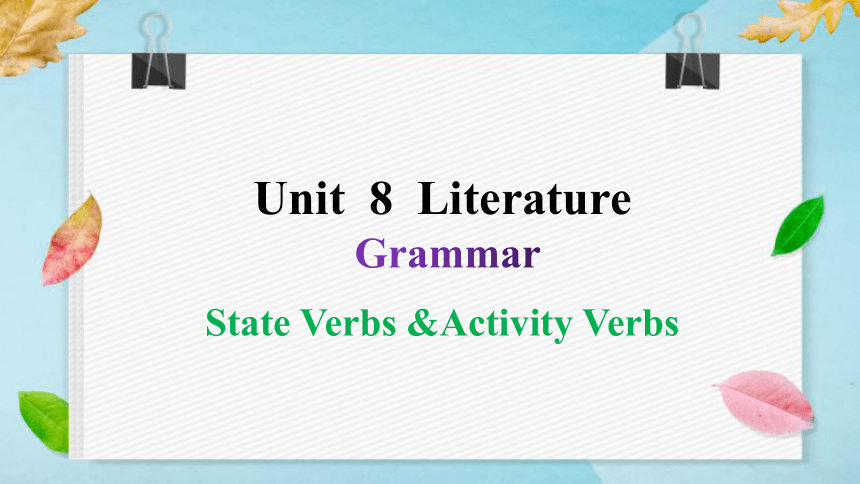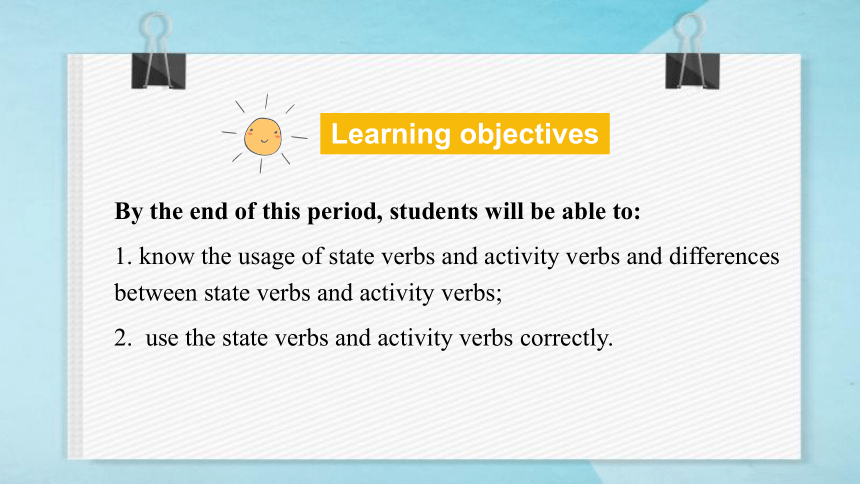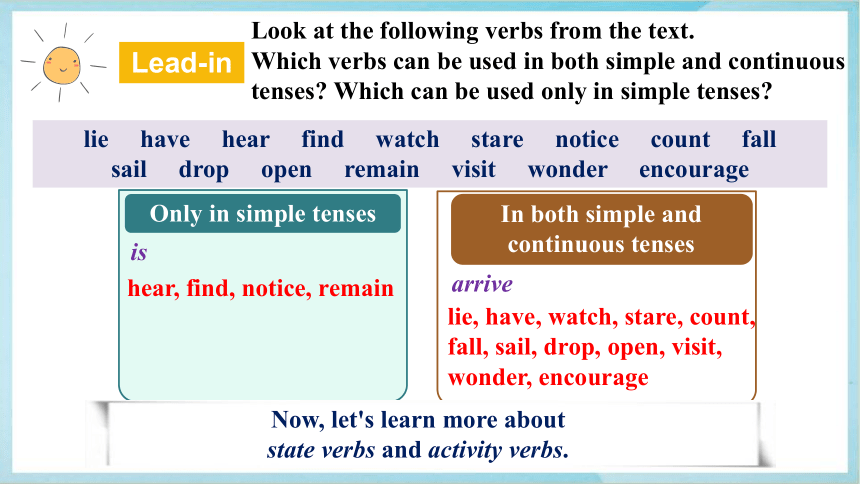Unit 8 Literature Grammar 课件(共13张)2024-2025学年高二英语北师版(2019)选择性必修3
文档属性
| 名称 | Unit 8 Literature Grammar 课件(共13张)2024-2025学年高二英语北师版(2019)选择性必修3 |

|
|
| 格式 | pptx | ||
| 文件大小 | 1.1MB | ||
| 资源类型 | 教案 | ||
| 版本资源 | 北师大版(2019) | ||
| 科目 | 英语 | ||
| 更新时间 | 2025-05-01 16:20:48 | ||
图片预览






文档简介
(共13张PPT)
Unit 8 Literature
Grammar
State Verbs &Activity Verbs
By the end of this period, students will be able to:
1. know the usage of state verbs and activity verbs and differences between state verbs and activity verbs;
2. use the state verbs and activity verbs correctly.
Learning objectives
Look at the following verbs from the text.
Which verbs can be used in both simple and continuous tenses Which can be used only in simple tenses
lie have hear find watch stare notice count fall
sail drop open remain visit wonder encourage
Only in simple tenses
is
In both simple and continuous tenses
arrive
hear, find, notice, remain
lie, have, watch, stare, count, fall, sail, drop, open, visit, wonder, encourage
Now, let's learn more about
state verbs and activity verbs.
Lead-in
State verbs& Activity verbs
What are activity verbs and state verbs
Activity verbs describe activities and can be used in simple and continuous tenses.
State verbs describe states and are not used in continuous tenses.
动作动词与状态动词
英语动词按其是否可以用于进行时态的语义特征,分为动作动词和状态动词。大量的动词是表示动作的,可以用于进行时态。有一些动词是表示状态的,不能用于进行时态。还有不少动词,兼有动作和状态两种特性,而其含义是不同的。
状态动词包含的种类
· They are of equal height.
· She was away for quite a time.
他们一样高。
她已经离开了相当一段时间。
1. 最基本的状态动词 —— 系动词be
状态动词强调主语所处的状态。
· I agree with most of what you said, but not all.
我同意你所说的大部分,但不是全部。
2. 表示思维活动,常见的有:admit, believe,
know, mean, prefer, realise, think等。
· I don't like lining up in the cold to go to the cinema.
我不喜欢在大冷天里排队等着看电影。
3. 表示情感,常见的有:like, love, care, hope等。
· The rose look and smell beautiful.
玫瑰看起来和闻起来都很美。
4. 感官类系动词,如:feel, hear, look, sound, taste, smell等。
· The book contains varieties of pictures.
这本书里有各种各样的画。
5. 表示拥有和存在,常见的有:have, contain, own, include, appear, care等。
感官动词后要使用形容词,而不用副词。
有些状态动词也可以表示动作。
在这种语境下,这些动词可以用于进行时态:
· We have a second-hand car.
She is having some tea.
· I think it's a great idea.
I'm thinking about my exam.
· I feel I can't go through with it.
How are you feeling
(have = possess, a state)
(have = drink, an activity)
(think = believe, a state)
(think = consider, an activity)
(feel = believe, a state)
(feel = experience, an activity)
情景导学2
动作动词包含的种类
· Mary is reading an English novel.
· I read much less now than I used to.
· Sorry, I wasn't really listening.
· I listen to the radio on the way to work.
玛丽正在读一本英文小说。
我现在看的书比过去少得多。
对不起,我没注意听。
我在上班的路上听广播。
1. 表示持续性动作的动词,常见的有:eat, listen, read, run等。
· The water is warm in the pool, so Mary jumps in.
池里的水很暖和,所以玛丽就跳了下去。
2. 表示短暂性动作的动词,常见的有:hit, jump等。这类动词如果用在现在时中,可表示现时的一次性动作。
· I go home at 7:00 pm.
· I am going home at 7:00 pm tomorrow.
我下午七点回家。
3. 表示转变和移动的动词,常见的有:arrive, change, come, go, leave等。
我将在明天下午七点回家。
这类动词用于一般现在时表示现时的习惯性动作,用于进行时表示即将发生的事态。
状态动词与动作动词的区别
· Close the window!
· Have a pen.
1. 动作动词可用于祈使句,而状态动词则不能。
· She is playing volleyball.
· That dictionary is belonging to Tom.
2. 动作动词可用于进行时,而状态动词则不能。
· My mother asked me to put the book back.
· My mother asked me to own the book.
3. 动作动词可用于作宾补,而状态动词则不能。
用所给动词的适当形式填空
① It_____ yesterday, it_________ now and it’s reported that it _________tomorrow. (rain)
②I was surprised to find that he ___________ into a fine young man.(grow)
③He entered the room and _____ down in a chair(sit).
④He________the door and ran out of the house.(open)
⑤He___________ and closing the door to make sure that it worked properly.(open)
rained
is raining
will rain
had grown
sat
opened
was opening
Practice
表示持续性动作
表示短暂性动作
表示转变和移动
系动词be
表示思维活动
表示情感
感官类系动词
表示拥有和存在
动作动词
状态动词
英语动词
区别:
1. 动作动词可用于祈使句,
而状态动词则不能。
2. 动作动词可用于进行时,
而状态动词则不能。
3. 动作动词可用于作宾补,
而状态动词则不能。
Review
Unit 8 Literature
Grammar
State Verbs &Activity Verbs
By the end of this period, students will be able to:
1. know the usage of state verbs and activity verbs and differences between state verbs and activity verbs;
2. use the state verbs and activity verbs correctly.
Learning objectives
Look at the following verbs from the text.
Which verbs can be used in both simple and continuous tenses Which can be used only in simple tenses
lie have hear find watch stare notice count fall
sail drop open remain visit wonder encourage
Only in simple tenses
is
In both simple and continuous tenses
arrive
hear, find, notice, remain
lie, have, watch, stare, count, fall, sail, drop, open, visit, wonder, encourage
Now, let's learn more about
state verbs and activity verbs.
Lead-in
State verbs& Activity verbs
What are activity verbs and state verbs
Activity verbs describe activities and can be used in simple and continuous tenses.
State verbs describe states and are not used in continuous tenses.
动作动词与状态动词
英语动词按其是否可以用于进行时态的语义特征,分为动作动词和状态动词。大量的动词是表示动作的,可以用于进行时态。有一些动词是表示状态的,不能用于进行时态。还有不少动词,兼有动作和状态两种特性,而其含义是不同的。
状态动词包含的种类
· They are of equal height.
· She was away for quite a time.
他们一样高。
她已经离开了相当一段时间。
1. 最基本的状态动词 —— 系动词be
状态动词强调主语所处的状态。
· I agree with most of what you said, but not all.
我同意你所说的大部分,但不是全部。
2. 表示思维活动,常见的有:admit, believe,
know, mean, prefer, realise, think等。
· I don't like lining up in the cold to go to the cinema.
我不喜欢在大冷天里排队等着看电影。
3. 表示情感,常见的有:like, love, care, hope等。
· The rose look and smell beautiful.
玫瑰看起来和闻起来都很美。
4. 感官类系动词,如:feel, hear, look, sound, taste, smell等。
· The book contains varieties of pictures.
这本书里有各种各样的画。
5. 表示拥有和存在,常见的有:have, contain, own, include, appear, care等。
感官动词后要使用形容词,而不用副词。
有些状态动词也可以表示动作。
在这种语境下,这些动词可以用于进行时态:
· We have a second-hand car.
She is having some tea.
· I think it's a great idea.
I'm thinking about my exam.
· I feel I can't go through with it.
How are you feeling
(have = possess, a state)
(have = drink, an activity)
(think = believe, a state)
(think = consider, an activity)
(feel = believe, a state)
(feel = experience, an activity)
情景导学2
动作动词包含的种类
· Mary is reading an English novel.
· I read much less now than I used to.
· Sorry, I wasn't really listening.
· I listen to the radio on the way to work.
玛丽正在读一本英文小说。
我现在看的书比过去少得多。
对不起,我没注意听。
我在上班的路上听广播。
1. 表示持续性动作的动词,常见的有:eat, listen, read, run等。
· The water is warm in the pool, so Mary jumps in.
池里的水很暖和,所以玛丽就跳了下去。
2. 表示短暂性动作的动词,常见的有:hit, jump等。这类动词如果用在现在时中,可表示现时的一次性动作。
· I go home at 7:00 pm.
· I am going home at 7:00 pm tomorrow.
我下午七点回家。
3. 表示转变和移动的动词,常见的有:arrive, change, come, go, leave等。
我将在明天下午七点回家。
这类动词用于一般现在时表示现时的习惯性动作,用于进行时表示即将发生的事态。
状态动词与动作动词的区别
· Close the window!
· Have a pen.
1. 动作动词可用于祈使句,而状态动词则不能。
· She is playing volleyball.
· That dictionary is belonging to Tom.
2. 动作动词可用于进行时,而状态动词则不能。
· My mother asked me to put the book back.
· My mother asked me to own the book.
3. 动作动词可用于作宾补,而状态动词则不能。
用所给动词的适当形式填空
① It_____ yesterday, it_________ now and it’s reported that it _________tomorrow. (rain)
②I was surprised to find that he ___________ into a fine young man.(grow)
③He entered the room and _____ down in a chair(sit).
④He________the door and ran out of the house.(open)
⑤He___________ and closing the door to make sure that it worked properly.(open)
rained
is raining
will rain
had grown
sat
opened
was opening
Practice
表示持续性动作
表示短暂性动作
表示转变和移动
系动词be
表示思维活动
表示情感
感官类系动词
表示拥有和存在
动作动词
状态动词
英语动词
区别:
1. 动作动词可用于祈使句,
而状态动词则不能。
2. 动作动词可用于进行时,
而状态动词则不能。
3. 动作动词可用于作宾补,
而状态动词则不能。
Review
